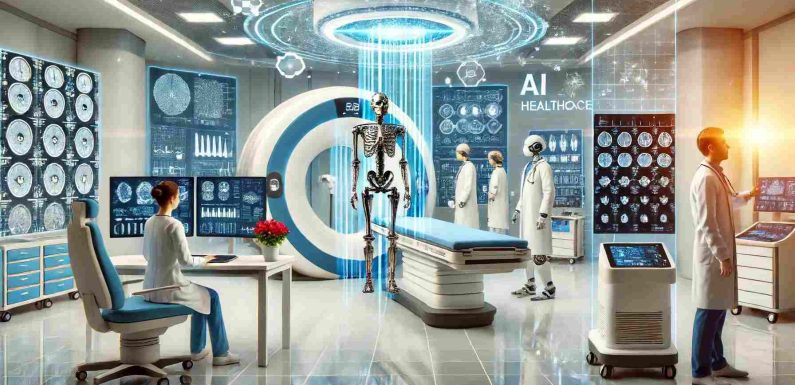
Introduction
AI is changing many parts of life. Its impact on healthcare is big. AI is changing how healthcare providers care for patients. It affects diagnostic tools, treatment protocols, preventive medicine, and patient management. This article explores how AI in healthcare is improving outcomes. It is also streamlining processes. And it is creating new challenges and opportunities.
Enhanced Diagnostics
One of the most significant contributions of AI in healthcare is in diagnostics. Machine learning algorithms can analyze lots of medical data. This data includes images from MRIs, CT scans, and X-rays. They do so much faster and usually more accurately than human radiologists. For example, AI systems can detect subtle patterns. These patterns may show early diseases that a human might miss. This ability speeds up diagnosis. It also improves accuracy. This leads to earlier interventions and better patient outcomes.
Personalized Medicine
AI is key in developing personalized medicine. It aims to tailor treatment to each patient’s unique characteristics. AI can analyze data from a patient’s genes, lifestyle, and environment. This data can be used to predict the risk of diseases. It can also suggest custom prevention plans or treatments. This approach is promising in oncology. AI predicts how individuals will respond to cancer treatments. This improves treatment and cuts side effects.
Robotic Surgery
In the operating room, robotic systems have AI. They give surgeons new tools. The systems are robotic. They can perform complex surgical tasks well. They do so with precision and flexibility beyond human abilities. AI-driven robotic surgery improves surgery results. It also speeds recovery and cuts infection risk.
Virtual Health Assistants
AI-powered virtual health assistants and chatbots are increasingly being used for patient management. They also do routine health checks. These systems can handle everything from scheduling appointments to giving basic healthcare information. They also remind patients to take their medications. They are also invaluable in managing chronic conditions like diabetes. They offer constant monitoring and real-time advice. This helps in maintaining good health.
Predictive Healthcare
AI can predict health issues. This ability is perhaps its most valuable use in healthcare. AI models can analyze patterns and trends from various health data. They can use this to identify people at high risk for specific conditions. This allows for earlier intervention. For example, AI systems are trained to predict heart attacks and strokes. They do this by analyzing EKG results, which can detect anomalies in several hours or days before these events.
Challenges in Implementing AI
AI has clear benefits in healthcare. But, its implementation faces big challenges. One major concern is data privacy. Healthcare providers rely more on AI. The amount of data they collect grows fast. It is essential to keep this data secure. It must be done in compliance with HIPAA and other privacy rules.
Another challenge is the potential for AI to perpetuate existing biases in healthcare. AI systems learn from historical data, which may include biased human decisions. Without careful design and training, AI systems could reinforce these biases. This would lead to unequal treatment.
Ethical Considerations
The integration of AI into healthcare also raises complex ethical issues. People are still debating what AI systems are allowed to do. They also debate how the systems interact with patients. They are debating who is ultimately responsible for them. Transparency in how AI systems decide is key. It builds trust among healthcare providers and patients.
The Future of AI in Healthcare
Looking ahead, the potential of AI in healthcare is enormous. AI technologies will keep advancing. They are expected to drive better patient care and efficiency. But, for AI to reach its potential, technologists, healthcare providers, regulators, and patients must collaborate.
Healthcare systems need to train their staff to work well with AI tools. They also need to invest in this. Policymakers must craft regulations that promote innovation. The rules must also protect patient interests. Also, patients must learn the pros and cons of AI in healthcare. This will help them make health decisions well.
Conclusion
AI in healthcare is a big change. It transforms how care is given and managed. It promises to improve all parts of patient care. It will help with prevention, diagnosis, treatment, and follow-up. This technology keeps evolving. It could greatly improve health outcomes for millions of people worldwide. It will make healthcare more predictive, personalized, and effective. Embracing these changes is key. But, to realize the full promise of AI in healthcare, we’ve got to address the challenges that come with it.
Tech World Times (TWT), a global collective focusing on the latest tech news and trends in blockchain, Fintech, Development & Testing, AI and Startups. If you are looking for the guest post then contact at techworldtimes@gmail.com

